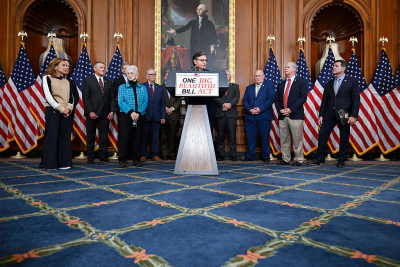Este artículo estará disponible en español en El Tiempo Latino.
A House-passed reconciliation bill would reduce federal funding to states that provide state-funded health insurance to people in the U.S. illegally, resulting in 1.4 million people losing coverage, according to a preliminary Congressional Budget Office analysis. But President Donald Trump and Republican lawmakers have wrongly cast the bill as removing these immigrants from Medicaid.
Medicaid is a joint federal-state government program that provides health coverage for low-income individuals and families. People living in the U.S. illegally are not eligible to receive Medicaid benefits other than for emergency medical services.
“A state funded program is by definition not Medicaid,” Leonardo Cuello, a research professor at the Georgetown University McCourt School of Public Policy’s Center for Children and Families, told us in an email.
But in a May 16 Truth Social post encouraging Republican lawmakers to support the wide-ranging House budget bill, which makes changes to Medicaid and extends expiring income tax cuts, among other things, Trump said the legislation would remove from Medicaid “millions” of people illegally residing in the country.

“Republicans MUST UNITE behind, ‘THE ONE, BIG BEAUTIFUL BILL!,'” Trump’s post reads. “Not only does it cut Taxes for ALL Americans, but it will kick millions of Illegal Aliens off of Medicaid to PROTECT it for those who are the ones in real need.”
As for the tax cuts, about 80% of U.S. households – not 100% – would receive them under the bill, according to estimates by the nonpartisan Tax Policy Center.
To support his Medicaid claim, the White House sent us a May 13 social media post from the Republican-led House Committee on Energy and Commerce. That post on X about “strengthening Medicaid” by “eliminating waste, fraud, and abuse” suggested that “1.4 million illegal immigrants” would lose Medicaid coverage as a result of the bill, according to a “preliminary CBO estimate on coverage changes.”
The CBO estimated that overall, the Medicaid provisions in the Republican bill would reduce the number of people with Medicaid or Children’s Health Insurance Program coverage by 10.3 million by 2034, though some would retain or acquire other insurance. A net 7.6 million people would become uninsured, CBO said.
But the agency did not say that 1.4 million people in the U.S. illegally would lose Medicaid benefits.
The Senate Republicans account on X wrongly claimed in a May 20 post that the bill “protects Medicaid for eligible Americans by removing 1.4 million illegals.” That was a day after White House Press Secretary Karoline Leavitt also inaccurately claimed that, under the bill, “the 1.4 million illegal aliens who are currently improperly receiving Medicaid benefits will be kicked off the program to preserve it for hardworking American citizens who need it.”
And after the House narrowly passed the bill early on May 22 with only Republican votes, House Speaker Mike Johnson claimed that Democrats voting against the bill showed they wanted “Medicaid for illegal immigrants.”
CBO, which analyzed provisions in an early draft of the Energy and Commerce Committee’s portion of the House budget bill, said that, in 2034, 1.4 million people would lose “other coverage” — specifically health insurance through “state-only funded programs” under current law.
The 1.4 million “includes people without verified citizenship, nationality, or satisfactory immigration status,” the CBO said.
Those individuals are presumed to lose their state-provided health benefits because the House bill includes language penalizing states that provide “any form of financial assistance” for health coverage or “any form of comprehensive health benefits” to immigrants living in the country illegally “regardless of the source of funding.”
For those states, the bill proposes reducing from 90% to 80% the Federal Medical Assistance Percentage rate that the federal government is required to pay to states that expanded Medicaid for eligible individuals under the Affordable Care Act.
The CBO analysis assumes that at least some states, deterred by reduced federal payments for their Medicaid programs, would stop offering their state-funded health programs to immigrants without lawful immigration status, leaving more than 1 million of them uninsured.
But those individuals would not come from the Medicaid program.
“Medicaid is when a state is accepting federal Medicaid dollars in compliance with federal Medicaid coverage rules,” Cuello, the Georgetown University professor, told us. So the bill’s provisions aren’t about Medicaid, he said. “And of course, undocumented immigrants are also not eligible for comprehensive coverage in Medicaid.”
The health policy research group KFF said that, as of April, there were 14 states, plus the District of Columbia, that use state taxpayer money, not federal funds, to cover children regardless of immigration status, including seven states and D.C. that also cover some adults regardless of immigration status.
“So there are not millions of undocumented people losing [Medicaid] coverage because of this bill, since they don’t have comprehensive coverage under Medicaid to begin with, and the very limited emergency Medicaid coverage provided to immigrants is not changed under the bill,” Cuello said.
Cuello told us that hospitals can request reimbursement for providing emergency medical assistance, such as emergency labor and delivery, to people in the country illegally who would otherwise be eligible for Medicaid if not for their immigration status. Those reimbursements are paid using state and federal money known as Emergency Medicaid funding.
KFF has said that less than 1% of all Medicaid spending is used for covering emergency care for immigrants who are not U.S. citizens. That information comes from a CBO report on fiscal years 2017 to 2023.
Since House Republicans have passed their bill, it now goes to the Senate for consideration.
Editor’s note: FactCheck.org does not accept advertising. We rely on grants and individual donations from people like you. Please consider a donation. Credit card donations may be made through our “Donate” page. If you prefer to give by check, send to: FactCheck.org, Annenberg Public Policy Center, P.O. Box 58100, Philadelphia, PA 19102.